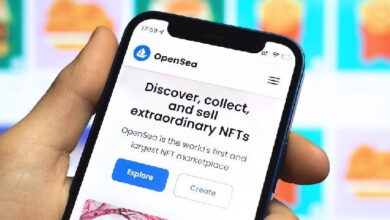Shanghai-Based Exchange Issues NFTs Despite China’s Ban on Crypto

NFT
The Shanghai Data Exchange will airdrop 1,000 Ethereum non-fungible tokens (NFTs) on a first-come-first-served basis on Apr 13, despite the Chinese government’s ban on crypto.
Holders of the Foresee Future – Sci & Tech Interconnection NFTs can claim a custom physical baggage tag at the Hong Kong International Innovation and Technology Exhibition. The exhibition takes place in April 2024.
NFT Collaboration Hopes to Link Shanghai With Hong Kong
Those wishing to receive the NFTs must register their interest by connecting their MetaMask, Argent, Rainbow, or WalletConnect wallets from 18:00UTC on April 12. The exchange will close the claim window at 23:59 local time on April 14. The airdrop will conclude on Apr 16
Crypto content platform CryptoNatty will manage the airdrop through its Launch Tower portal.
The airdrop is designed to boost collaboration between Hong Kong, a burgeoning crypto hub, and the Shanghai Data Exchange, a semi-public organization dedicated to building technologies around asset tokenization.
The airdrop comes despite the Chinese government’s hard line stance against cryptocurrencies. In 2021, the government banned mining and trading on the mainland and has reportedly discouraged the speculative trading of NFTs.
Four Chinese tech behemoths, Tencent, Ant, Baidu, and JD, subsequently self-imposed secondary market trading of NFTs.
Searches for Bitcoin on popular Chinese microblogging site Weibo and Douyin reveal no market data. Instead, the sites warn that cryptocurrencies do not have the same status as legal tender and should be invested in cautiously.
Huang Yiping, a former People’s Bank of China adviser, warned that China may miss opportunities through its crypto ban.
China Favors Tokenization Over Tokens
Despite showing resistance to digital assets, China is more open to the potential of blockchains as an asset management tool.
The government approved the launch of the China Digital Trading Platform (CDEX) for NFTs and other digital assets in January.
The new state-approved platform enlisted a working group of museums, tourist organizations, and copyright holders on launch. The platform also includes a metaverse working group involving state-owned companies and local governments.
The platform eventually wants to become a state inventory for tradable digital assets. It will offer registration, monitoring, and the administration of copyrights through a separate China Cultural Protection blockchain.
For Be[In]Crypto’s latest Bitcoin (BTC) analysis, click here.





